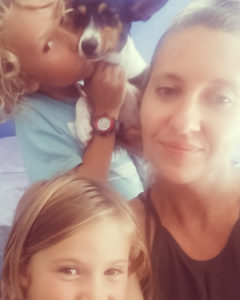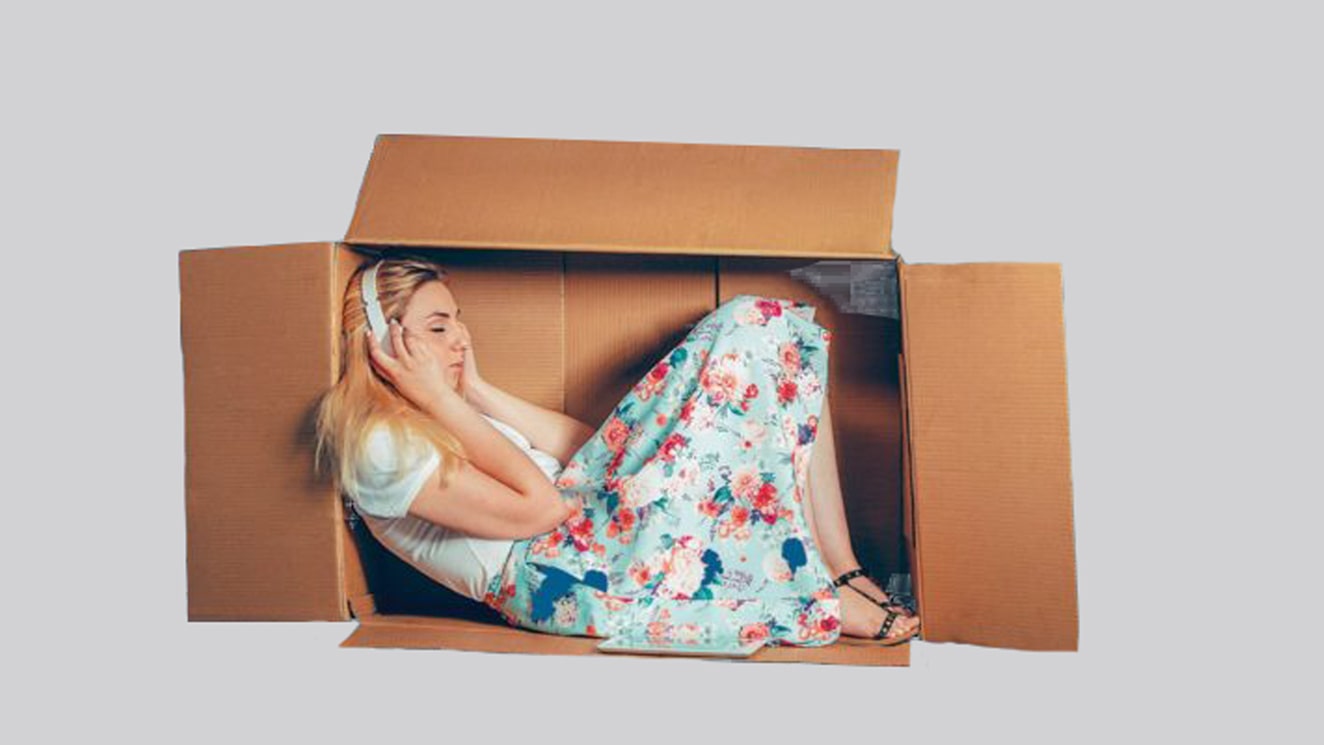

In our mid-twenties, my husband and I adopted a dog-baby. At least that’s how we thought of her at the time. A sixty-pound mutt, tricolor and floppy-eared like a giant Beagle, Sheena made perfect sense at that moment in our lives. The responsibility of taking care of her added a certain heft to our marriage. She shed in our bed and stepped all over us in her excitement when we came home; she felt like a first child, and we loved her.
Sheena was a wreck on city streets, alternately aggressing and cowering if another crossed our path. But alone with us at home, or — in her natural element, the woods — she was the perfect pet. We could let her off leash on the remotest of mountain trails and she always came back when called. “Sheena knows which side her bread is buttered on,” we joked.
Then, on my thirtieth birthday in a little seaside vacation town, the prophesied biological clock struck midnight: I wanted a baby. Right now. An unstoppable desire was ignited in me, and, I was lucky to get pregnant quickly.
I banished Sheena from the bed during those nine months. First to the foot of the bed, and then — as I struggled with a mountain of pillows and my pendulous belly — all the way out of it. I gave birth to my son at home, and though in my idealized vision of the day I pictured Sheena offering companionship and comfort, instead she sought solitude in her crate; I suppose it made sense.
My son was nothing if not an adorable, rarely sleeping infant who grew into a temperamental, whip-smart toddler. I nursed him for two years, worked part-time outside the house, and generally felt frazzled and worn out—leaking milk and forgetting everything, stressed about money and distressed that I had to leave my baby in another’s care. Walking the dog became an afterthought, a to-do, a chore. I showered my son with the kind of attention that I once did on the dog: a natural progression. I still loved Sheena, there was just much less of me left over to give.
Every once in a while, if my son was sleeping, I’d snuggle up to Sheena’s warm, soft bulk on the couch and my heart would ache for the closeness we once had. Then, inevitably, my son would wake and I’d plunge back into the immersive reality of parenting a small human. All my energy went back to my son.
Sometimes Sheena’s howls would wake my son from hard-won naps, and any flicker of connection between us would disappear, replaced by my deep annoyance. When Sheena snapped at my son as he toddled near her food bowl I pushed her out of my heart a little more. Where I once felt guilt if we left Sheena alone slightly past her dinnertime or skimped on a walk, now I only had room for ubiquitous mother-guilt. Was my son spitting up because I had eaten dairy? Was the fact that he wouldn’t sleep through the night my fault because I’d timed things wrong? And when I went back to work part-time, I fretted constantly about whether the nanny could care for my son as well as I did.
Then Sheena got sick. She plummeted from healthy middle age to sudden lethargy to irreversible kidney failure in a few weeks.
Owning a dog is not parenthood; at least I didn’t think of it that way anymore. Still, Sheena had depended on us for food, shelter, care and love—a responsibility that resembles parenthood in its own way. It was that responsibility I felt we were unforgivably betraying when we carried her into our vet’s office for the last time and wept into her fur as the pentobarbital injection paralyzed her heart. Her body on the table in the vet’s examining room was still warm when my husband and I slipped, weightless and diminished, into the December night.
My husband and I wept together, and separately, over Sheena’s death. Though we had continued to provide for her after our son was born, we both knew that we had failed her, too. Failed to take her on the long, woodsy walks she loved. Failed to carve a place for her in our newfound human trio. Failed to love her enough. Had she died to rid us of the inconvenience of her? The irrational thought crossed my mind.
With abrupt finality, Sheena’s death vacated space in my repertory of care. As much as I missed my dog, her loss let me see that I wanted another baby.
***
Fast forward six dogless years. The first year both my kids were in elementary school I felt as if I was emerging, slowly, from the near-obliterative relentlessness of pregnancies and breastfeeding and two kids who rarely slept.
While getting ready for work on a Saturday morning, I suggested my husband take the kids on an exploratory mission to a shelter. He expressed reluctance to adopt again, citing the financial and emotional toll. The kids had already made it clear that they wanted a cat; I’m allergic.
But never underestimate the spell of an adorable puppy. “How soon can you get down here?” my husband asked when I finally picked up after the third missed call from him that afternoon. “They need both of us to sign the adoption paperwork.”
This puppy will grow only about one-fourth of Sheena’s size, but he’s a Sheena mini-me: a tricolor mutt named Pesach, the Hebrew word for Passover, because we brought him home on the second of that eight-night holiday.
Though he resembles Sheena, Pesach is also her opposite: he leaves food in his bowl while she gobbled it up within seconds and begged for more. Sheena’s wariness of small beings is replaced by Pesach’s love of kids and their pouncing, bouncing ways.

***
My kids challenge me daily—which, I understand, is a common parenting experience. They’re fabulously inquisitive and love to relate; great, except that I’m a quiet person. They complain and whine, as kids do. They are working out their negotiation skills in the testing ground of home; still, constant negotiation (one could say arguing) wears on me.
They fight. They still ask me for a glass of water when they are perfectly capable of getting one themselves. They are cute, but not always. Kind and wonderful human beings, except when purposely annoying one another or not listening to a word out of my mouth. In other words, totally normal.
I love them more than I thought possible.
Still, I wonder whether it’s a crime against the sanctity of motherhood that these days I enjoy walking alone with Pesach so much more than with my kids? That I treasure the blessed, wordless communion between human and dog? Do I feel a little bad that I rush the kids out of my bed at night after reading and cuddles because once they’re gone, the puppy curls himself into the crook of my elbow while I read my own book? Perhaps. Yet these things are still true.
I have wondered why my story with dogs and kids has come full circle in this way. Why did I push Sheena away when my son was small, and now snuggle my new puppy more readily than I do my children? Is it that the newest and youngest addition to a family is the most babied, the most adored—even when it’s a dog? Novelty may play a small role.
Is it due to my introverted nature that I find the preverbal (or nonverbal) stage of care-giving more manageable? That’s also part of it.
I think another layer of this question, for me, is vulnerability. My most protective feelings seem directed to the one who needs protection the most. Whose small body and easily thwarted needs must I safeguard? That creature seems to be the one I favor.
But the heart of it, I think, is the fact that with a dog, choices are simpler and less fraught with second-guessing. It’s relatively easy to raise a dog well, but parenting is…complicated. There’s a lot more at stake. The dog will not go to therapy one day and complain about how I raised him. My guilt over our quasi-neglect of Sheena notwithstanding, I won’t spend my own time on a therapist’s couch, twenty years from now, wishing I had made different decisions with the dog. But I surely will with my kids. Doing my best as a parent and knowing that I’m falling far short in certain ways are two corollary statements. They go with the territory.
Sometimes, you just don’t want to try to answer baffling questions, like where God lives. You don’t want to mediate an argument about who gets to choose the movie tonight or what’s fair or not fair regarding chores, friends and dessert. Sometimes you don’t want to worry about doing it right. You just want to take a walk with your dog.







